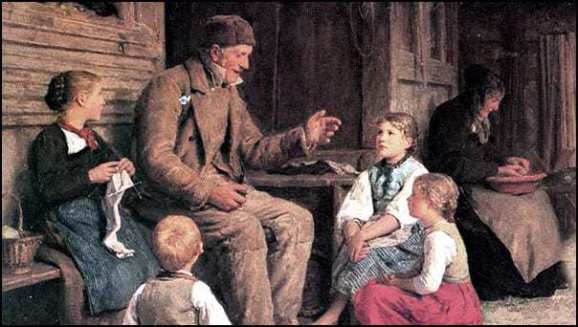Why We Need Story
By Steven D. Malone
Once upon a time, a dark and stormy story voiced. I listened.
Many stories actually. My soul filled with them. The walls and shelves groaned under the burden of their weight.
Once, in my immeasurably misspent youth, I hitchhiked home from San Francisco to Houston, Texas carrying 30 pounds of boxed books alongside a duffle and a backpack. I would have ditched the duffle before I let go the books.
I carried this weight because I need story. Always have. Always will.
I’m not alone in this I think. You need story. We all need story.
This need birthed itself, in a which-came-first-the-chicken-or-the-egg way, the day the first Pleistocene caveman lied to his hungry family about the big one that got away. With appropriate embellishments, of course.
“If you’re going to have a story, have a big story, or none at all.” – Joseph Campbell
Somehow, story making and telling is wired into our very brain. Right alongside the mind’s ability to use language. Like a sort of Language 2.0. A “meta-grammar”, if you will. Our minds may be a “story processor, not a logic processer” – says Jonathan Haidt. And story hugely profits our species.
We might not recall facts, but story has a way of embedding into our minds and remaining with a tenacity only rivaled by music. – Kristen Lamb
In my heart I feel that telling and listening is just plain fun. There need be no other purpose. However, I find that way too many experts tell me that it has other, more profound, purposes.
Storytelling gives our species a leg up on the food chain scale. By itself, the ability to tell stories may be an evolutionary step separating us from other animals. It’s damn useful.
It can tell us how our world works. It shows us valuable information on tool making and use. How to bag the big game. How to make fire. How to hide from the lion. It tells us about our tribe, the history of its heroes, and how our tribe is better than other tribes. Story unifies us, reaffirming tribal truths and strengths. What better ways are there to account for the triumphs of our tribe?
Laura McGuire, https://www.philosophytalk.org/blog/evolution-storytelling, speculates that stories help us avoid our troubles by allowing us to enter imaginary worlds. To relax and escape our reality. And, maybe, it gives us an advantage in finding a mate. Tell a good story, hold another person’s attention, and seduce them with our words.” (I like that last one especially.)
She reinforces the idea that our mythologies and histories, shared, provide pooled resources that make the group stronger.
They tell me what we do and how we live and occasionally, if I’m lucky, they tell me why. There is a commonality to stories that makes us whole beings…” - Pete Sleeth
So, what is a story?
Piper Hendricks says: A story is “a character-based narration of a character’s struggles to overcome obstacles and reach an important goal. Stories convey values. In each of the five stages of a well-told story different chemicals are released. A “well-told” story is one that reaches your audience. You will only reach your audience and transport them into the world of your character if they relate to the character. A good story conveys values, emotion, action and creativity.
Well, I think he overstated what a story is. A little anyway. Something got skipped as well. What, to me, was left out was that a story “reaches your audience” because it entertains. It’s fun. That’s the way those chemicals get released.
Empathy.
A reader, a listener, needs to insert him or herself into the character. To hear Genesis, one must taste that apple. In The Lord of the Rings, you must feel the weight of the ring.
We humans, I believe, are addicted to vicarious living through tales told or read. Through all the eons, our species struggled through situations we must decipher or escape. This struggle, in times of rest, leaves us with a yearning. It does not let go. An itch that needs to be scratched.
We want more. In the dark of our cave, before the flicker of the hearth fire (or the TV), we seek more. We reach to open a book. We grab the remote. We yearn to relive (vicariously) the adventure of our lives.
Open a book you crazy guys. We need it. Scratch. And, maybe, live happily ever after.
Have any comments or thoughts on any of the postings in this blog?
Feel free to email me at: smalone@stevenspen.com



